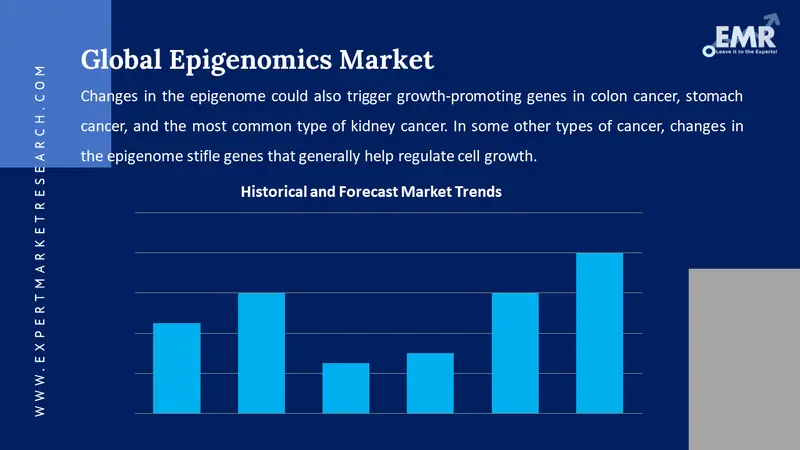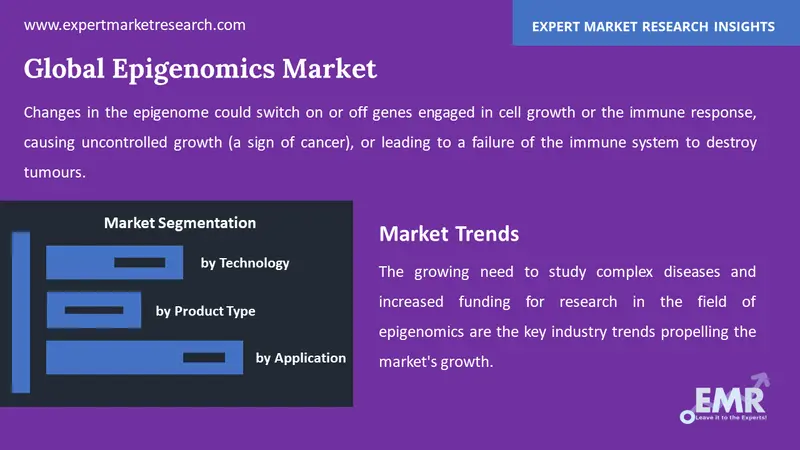
Consumer Insights
Uncover trends and behaviors shaping consumer choices today
Procurement Insights
Optimize your sourcing strategy with key market data
Industry Stats
Stay ahead with the latest trends and market analysis.
Base Year
Historical Year
Forecast Year






The global epigenomics market is expected to grow at a CAGR of 13.1% during the forecast period of 2025-2034, driven by the rising prevalence of chronic diseases and genetic conditions, and the increasing need for research and development to explore enhanced treatment alternatives for diseases and conditions.
Modern techniques enable scientists to study epigenetic changes across entire genomes and determine how and where such changes occur. Scientists seek a better understanding of the occurrence of epigenetic changes and their consequences. Further, by identifying patterns of methylation tags across the whole genome and of histone modifications in various kinds of cells and tissues, it would be possible for scientists to recognize "signatures" associated with certain biological processes or disease states. North America, Europe and Asia are expected to be key markets.

Read more about this report - REQUEST FREE SAMPLE COPY IN PDF
Epigenomics refers to the study of the epigenome – a host of chemical compounds directing the functioning genome as a whole. These compounds attach to the DNA to activate or deactivate particular genes in the genome, changing its behaviour. Thus, the epigenome may influence regulation of protein production in some cells of the body. Researchers monitor locations and understand the functions of all the chemical tags marking the genome. When epigenomic compounds bind to DNA and alter its function, it is said that these compounds have "marked" the genome. While these marks do not change the DNA sequence, they alter the way cells use the DNA's instructions. The marks are occasionally passed on from cell to cell as cells divide. These also can be passed down from generation to generation.
There are trillion of cells in a human being; these cells have specific functions in the muscles, bones and brain, and each cell contains fundamentally the same genome in its nucleus. The way and when the different gene sets are turned on or off in different types of cells determine differences among cells. For example, specific cells in the eye turn on genes producing proteins that may detect light; particular cells in red blood cells produce proteins carrying oxygen from the air to the rest of the body. The epigenome regulates several of these changes to the genome. The epigenome is the group of chemical modifications to the DNA and DNA-associated proteins in the cell, altering gene behaviour, and are heritable (through meiosis and mitosis). The modifications take place as a natural process of development and tissue differentiation, and may be changed in response to environmental exposures or disease.
The first type of mark, known as DNA methylation, directly influences the DNA in a genome. In the process, proteins bind chemical tags called methyl groups to the bases of the DNA molecule in particular places. The methyl groups turn genes on or off by influencing interactions between the DNA and other proteins. Thus, cells can remember which genes are on or off. The second type of mark, called histone modification, influences DNA indirectly. DNA in cells is wrapped around histone proteins, forming spool-like structures enabling DNA's very long molecules to be coiled up neatly into chromosomes within the cell nucleus. Proteins can bind several chemical tags to histones. Other proteins in cells can identify these tags and decide whether that region of DNA should be used or ignored in the cell.
Lifestyle and environmental factors (which include smoking, diet and infectious disease) could expose an individual to pressures that induce chemical responses. These responses, in turn, could cause changes in the epigenome; some changes could be damaging. Cancers could be caused by changes in the genome, the epigenome, or both. Changes in the epigenome could switch on or off genes engaged in cell growth or the immune response, causing uncontrolled growth (a sign of cancer), or leading to a failure of the immune system to destroy tumours.
In cases of glioblastoma (a kind of brain tumour), the drug temozolomide has been used with some success; the drug kills cancer cells by attaching methyl groups to DNA. In some cases, methylation shows another positive – it blocks a gene that counteracts temozolomide. Patients with glioblastoma who have tumours with such methylated genes are more likely to respond to temozolomide as compared to those with unmethylated genes. Changes in the epigenome could also trigger growth-promoting genes in colon cancer, stomach cancer, and the most common type of kidney cancer. In some other types of cancer, changes in the epigenome stifle genes that generally help regulate cell growth.
Several research groups are engaged in an attempt to characterize the epigenome, and recognize, catalogue, and understand genome-wide DNA methylation patterns of all human genes in all key tissues. Such associations are multinational and multidisciplinary, and characterize the highest quality of research. Epigenomics, as a domain, has the potential to examine and reveal nongenetic components of complex diseases. It is hoped that with full genome sequence and epigenomic maps of the DNA methylation and modified histone landscapes, it would be possible to identify the exact genes that activated, and in which tissues. Such information would provide new ways to diagnose and treat complex diseases, and is expected to drive the global epigenomics market.

Read more about this report - REQUEST FREE SAMPLE COPY IN PDF
By technology, the global epigenomics market is segmented into:
By product type, the market is divided into:
By application, the market is classified into:
By region, the market is segmented into:
The report presents a detailed analysis of the following key players in the global epigenomics market, looking into their capacity, and latest developments like capacity expansions, plant turnarounds, and mergers and acquisitions:
The EMR report gives an in-depth insight into the industry by providing a SWOT analysis as well as an analysis of Porter’s Five Forces model.
| REPORT FEATURES | DETAILS |
| Base Year | 2023 |
| Historical Period | 2018-2024 |
| Forecast Period | 2025-2034 |
| Scope of the Report |
Historical and Forecast Trends, Industry Drivers and Constraints, Historical and Forecast Market Analysis by Segment:
|
| Breakup by Product Type |
|
| Breakup by Technology |
|
| Breakup by Application |
|
| Breakup by End User |
|
| Breakup by Region |
|
| Market Dynamics |
|
| Supplier Landscape |
|
| Companies Covered |
|
| Report Price and Purchase Option | Explore our purchase options that are best suited to your resources and industry needs. |
| Delivery Format | Delivered as an attached PDF and Excel through email, with an option of receiving an editable PPT, according to the purchase option. |
*While we strive to always give you current and accurate information, the numbers depicted on the website are indicative and may differ from the actual numbers in the main report. At Expert Market Research, we aim to bring you the latest insights and trends in the market. Using our analyses and forecasts, stakeholders can understand the market dynamics, navigate challenges, and capitalize on opportunities to make data-driven strategic decisions.*
Get in touch with us for a customized solution tailored to your unique requirements and save upto 35%!
The global epigenomics market size is anticipated to grow at a CAGR of 13.1% during the forecast period of 2025-2034, driven by the rising need to study complex diseases.
The major drivers of the market include the increasing shift towards personalised medicines, rising prevalence of diseases such as cancer, decreasing sequencing costs, increasing research activity, and growing applications of epigenetics in non-oncology diseases.
The growing need to study complex diseases and increased funding for research in the field of epigenomics are the key industry trends propelling the market's growth.
The major regions in the industry are North America, Latin America, the Middle East and Africa, Europe, and the Asia Pacific.
The various technologies involved in the market are histone methylation, large non-coding RNA, microRNA modification, DNA methylation, and chromatin structures, among others.
Based on product type, the market is segmented into kits, reagents, and enzymes, among others.
The significant applications of the market are diagnostics and pharmaceuticals.
The major players in the industry include Epigenomics AG, Illumina, Inc., Merck KGaA, Zymo Research Corporation, and Agilent Technologies, Inc., among others.
Datasheet
One User
USD 3,299
USD 2,969
tax inclusive*
Single User License
One User
USD 5,499
USD 4,949
tax inclusive*
Five User License
Five User
USD 6,999
USD 5,949
tax inclusive*
Corporate License
Unlimited Users
USD 8,199
USD 6,969
tax inclusive*
*Please note that the prices mentioned below are starting prices for each bundle type. Kindly contact our team for further details.*
Flash Bundle
Small Business Bundle
Growth Bundle
Enterprise Bundle
*Please note that the prices mentioned below are starting prices for each bundle type. Kindly contact our team for further details.*
Flash Bundle
Number of Reports: 3
20%
tax inclusive*
Small Business Bundle
Number of Reports: 5
25%
tax inclusive*
Growth Bundle
Number of Reports: 8
30%
tax inclusive*
Enterprise Bundle
Number of Reports: 10
35%
tax inclusive*
How To Order
Our step-by-step guide will help you select, purchase, and access your reports swiftly, ensuring you get the information that drives your decisions, right when you need it.

Select License Type
Choose the right license for your needs and access rights.

Click on ‘Buy Now’
Add the report to your cart with one click and proceed to register.

Select Mode of Payment
Choose a payment option for a secure checkout. You will be redirected accordingly.
Gain insights to stay ahead and seize opportunities.

Get insights & trends for a competitive edge.

Track prices with detailed trend reports.

Analyse trade data for supply chain insights.

Leverage cost reports for smart savings

Enhance supply chain with partnerships.

Connect For More Information
Our expert team of analysts will offer full support and resolve any queries regarding the report, before and after the purchase.
Our expert team of analysts will offer full support and resolve any queries regarding the report, before and after the purchase.
We employ meticulous research methods, blending advanced analytics and expert insights to deliver accurate, actionable industry intelligence, staying ahead of competitors.
Our skilled analysts offer unparalleled competitive advantage with detailed insights on current and emerging markets, ensuring your strategic edge.
We offer an in-depth yet simplified presentation of industry insights and analysis to meet your specific requirements effectively.



Australia
63 Fiona Drive, Tamworth, NSW
+61-448-061-727
India
C130 Sector 2 Noida, Uttar Pradesh 201301
+91-723-689-1189
Philippines
40th Floor, PBCom Tower, 6795 Ayala Avenue Cor V.A Rufino St. Makati City,1226.
+63-287-899-028, +63-967-048-3306
United Kingdom
6 Gardner Place, Becketts Close, Feltham TW14 0BX, Greater London
+44-753-713-2163
United States
30 North Gould Street, Sheridan, WY 82801
+1-415-325-5166
Vietnam
193/26/4 St.no.6, Ward Binh Hung Hoa, Binh Tan District, Ho Chi Minh City
+84-865-399-124
United States (Head Office)
30 North Gould Street, Sheridan, WY 82801
+1-415-325-5166
Australia
63 Fiona Drive, Tamworth, NSW
+61-448-061-727
India
C130 Sector 2 Noida, Uttar Pradesh 201301
+91-723-689-1189
Philippines
40th Floor, PBCom Tower, 6795 Ayala Avenue Cor V.A Rufino St. Makati City, 1226.
+63-287-899-028, +63-967-048-3306
United Kingdom
6 Gardner Place, Becketts Close, Feltham TW14 0BX, Greater London
+44-753-713-2163
Vietnam
193/26/4 St.no.6, Ward Binh Hung Hoa, Binh Tan District, Ho Chi Minh City
+84-865-399-124
Share